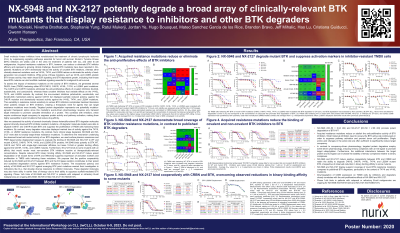Category: Encore
2020 - NX-5948 and NX-2127 potently degrade a broad array of clinically-relevant BTK mutants that display resistance to inhibitors and other BTK degraders

Small molecule kinase inhibitors have revolutionized the treatment of chronic lymphocytic leukemia (CLL) by suppressing signaling pathways essential for tumor cell survival. Bruton’s Tyrosine Kinase (BTK) inhibitors are widely used in the clinic for treatment of patients with CLL and other B cell malignancies. Acquired resistance mutations in BTK, however, can reduce or eliminate BTK inhibitor efficacy and represent a growing clinical challenge. Several BTK mutations have been reported in CLL patients. Mutations at C481 dramatically reduce the activity of covalent BTK inhibitors, whereas other clinically-observed mutations such as V416L, T474I, and L528W reduce or eliminate the activity of next-generation non-covalent inhibitors. While some of these mutations, such as V416L and L528W, abolish BTK kinase activity, they retain intact BCR signaling and BTK-dependent growth, indicating that kinase dead BTK mutants can elicit scaffold mediated signaling essential for malignant B cell survival.
To assess the impact of resistance mutations on the activity of BTK inhibitors, we generated several DLBCL lines (TMD8) harboring either BTK-C481S, C481R, V416L, T474I, or L528W point mutations. The C481S and C481R mutations eliminated the anti-proliferative effects of covalent inhibitors ibrutinib, acalabrutinib, and zanubrutinib, whereas the V416L, T474I, and L528W mutations had variable effects on the covalent inhibitors. By contrast, the non-covalent inhibitors pirtobrutinib, vecabrutinib, and fenebruitnib maintained activity against C481S but displayed partially reduced potency against the C481R mutation and dramatically reduced potency against the V416L, T474I, and L528W mutations. The variability in mutant sensitivity to BTK inhibitors poses additional challenges to treatment decisions for patients who relapse on BTK inhibitors, creating a therapeutic need for agents that can target resistance mutations more broadly. Targeted protein degradation represents one potentially mutation-agnostic therapeutic option since this modality’s event-driven pharmacology requires only transient target interaction to promote elimination of a protein. This contrasts with inhibitors, which require continuous target occupancy to suppress protein activity and pathway activation, making them highly susceptible to point mutations that reduce drug affinity.
Here we assessed the activity of several chemically diverse heterobifunctional BTK degrader molecules against clinically observed BTK inhibitor-resistant mutations. All degrader molecules were able to degrade C481S- and C481R-mutant BTK and suppress proliferation of TMD8 cells harboring these mutations. However, the majority of degrader molecules displayed marked loss of activity against the T474I, V416L, or L528W resistance mutations. By contrast, Nurix clinical stage degraders NX-5948 and NX-2127 were able to broadly target these resistance mutations. To determine the mechanism underlying the anti-mutant activity of our BTK degraders, we used surface plasmon resonance and FRET-based probe displacement assays to evaluate the binding of NX-5948 and NX-2127 to WT and mutant (C481S, C481R, T474I, V416L and L528W) BTK proteins. NX-5948 binds potently to BTK WT, C481S and T474I with single-digit nanomolar affinities, but loses 10-fold or greater binding affinity against the C481R, V416L, and L528W mutants. Furthermore, NX-2127 binds to some mutants with an affinity that would render most non-covalent BTK inhibitors inactive at therapeutically-relevant concentrations. Despite reduced BTK binary binding affinity, NX-5948 and NX-2127 induce potent degradation of all mutant forms of BTK and effectively suppress expression of activation markers and proliferation in TMD8 cells harboring these mutations. We propose that the positive cooperativity induced by NX-5948 and NX-2127 between BTK and the E3 ligase cereblon contributes to their potent and sustained degradation activity against BTK resistance mutants. The exceptional potency and activity of NX-5948 and NX-2127 against emerging BTK point mutations warrant their investigation in indications like CLL that develop diverse resistance to inhibitor molecules. These degrader molecules may also have utility in earlier lines of therapy due to their ability to suppress scaffold-mediated BTK signaling. Phase 1a/b trials of NX-5948 and NX-2127 in patients with relapsed or refractory B-cell malignancies are ongoing (NX-5948: NCT05131022; NX-2127: NCT04830137).
To assess the impact of resistance mutations on the activity of BTK inhibitors, we generated several DLBCL lines (TMD8) harboring either BTK-C481S, C481R, V416L, T474I, or L528W point mutations. The C481S and C481R mutations eliminated the anti-proliferative effects of covalent inhibitors ibrutinib, acalabrutinib, and zanubrutinib, whereas the V416L, T474I, and L528W mutations had variable effects on the covalent inhibitors. By contrast, the non-covalent inhibitors pirtobrutinib, vecabrutinib, and fenebruitnib maintained activity against C481S but displayed partially reduced potency against the C481R mutation and dramatically reduced potency against the V416L, T474I, and L528W mutations. The variability in mutant sensitivity to BTK inhibitors poses additional challenges to treatment decisions for patients who relapse on BTK inhibitors, creating a therapeutic need for agents that can target resistance mutations more broadly. Targeted protein degradation represents one potentially mutation-agnostic therapeutic option since this modality’s event-driven pharmacology requires only transient target interaction to promote elimination of a protein. This contrasts with inhibitors, which require continuous target occupancy to suppress protein activity and pathway activation, making them highly susceptible to point mutations that reduce drug affinity.
Here we assessed the activity of several chemically diverse heterobifunctional BTK degrader molecules against clinically observed BTK inhibitor-resistant mutations. All degrader molecules were able to degrade C481S- and C481R-mutant BTK and suppress proliferation of TMD8 cells harboring these mutations. However, the majority of degrader molecules displayed marked loss of activity against the T474I, V416L, or L528W resistance mutations. By contrast, Nurix clinical stage degraders NX-5948 and NX-2127 were able to broadly target these resistance mutations. To determine the mechanism underlying the anti-mutant activity of our BTK degraders, we used surface plasmon resonance and FRET-based probe displacement assays to evaluate the binding of NX-5948 and NX-2127 to WT and mutant (C481S, C481R, T474I, V416L and L528W) BTK proteins. NX-5948 binds potently to BTK WT, C481S and T474I with single-digit nanomolar affinities, but loses 10-fold or greater binding affinity against the C481R, V416L, and L528W mutants. Furthermore, NX-2127 binds to some mutants with an affinity that would render most non-covalent BTK inhibitors inactive at therapeutically-relevant concentrations. Despite reduced BTK binary binding affinity, NX-5948 and NX-2127 induce potent degradation of all mutant forms of BTK and effectively suppress expression of activation markers and proliferation in TMD8 cells harboring these mutations. We propose that the positive cooperativity induced by NX-5948 and NX-2127 between BTK and the E3 ligase cereblon contributes to their potent and sustained degradation activity against BTK resistance mutants. The exceptional potency and activity of NX-5948 and NX-2127 against emerging BTK point mutations warrant their investigation in indications like CLL that develop diverse resistance to inhibitor molecules. These degrader molecules may also have utility in earlier lines of therapy due to their ability to suppress scaffold-mediated BTK signaling. Phase 1a/b trials of NX-5948 and NX-2127 in patients with relapsed or refractory B-cell malignancies are ongoing (NX-5948: NCT05131022; NX-2127: NCT04830137).
- MN
Mark A. Noviski, PhD
Principal Scientist, Cell Biology
Nurix Therapeutics, Inc.
San Francisco, CA, United States - NB
- SY
- RM
- JY
- HB
- MS
- BB
- JM
- HL
- CG
- GH

